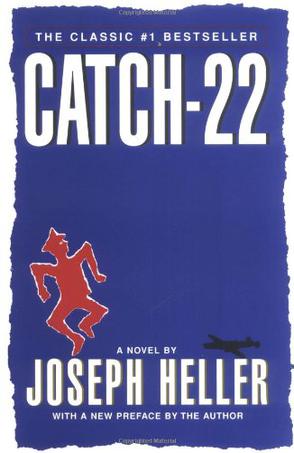内容简介
Catch-22 is like no other novel. It is one of the funniest books ever written, a keystone work in American literature, and even added a new term to the dictionary.
At the heart of Catch-22 resides the incomparable, malingering bombardier, Yossarian, a hero endlessly inventive in his schemes to save his skin from the horrible chances of war. His efforts are perfectly understandable because as he furiously scrambles, thousands of people he hasn't even met are trying to kill him. His problem is Colonel Cathcart, who keeps raising the number of missions the men must fly to complete their service. Yet if Yossarian makes any attempts to excuse himself from the perilous missions that he is committed to flying, he is trapped by the Great Loyalty Oath Crusade, the hilariously sinister bureaucratic rule from which the book takes its title: a man is considered insane if he willingly continues to fly dangerous combat missions, but if he makes the necessary formal request to be relieved of such missions, the very act of making the request proves that he is sane and therefore ineligible to be relieved.
Catch-22 is a microcosm of the twentieth-century world as it might look to some one dangerously sane -- a masterpiece of our time.
There was a time when reading Joseph Heller's classic satire on the murderous insanity of war was nothing less than a rite of passage. Echoes of Yossarian, the wise-ass bombardier who was too smart to die but not smart enough to find a way out of his predicament, could be heard throughout the counterculture. As a result, it's impossible not to consider Catch-22 to be something of a period piece. But 40 years on, the novel's undiminished strength is its looking-glass logic. Again and again, Heller's characters demonstrate that what is commonly held to be good, is bad; what is sensible, is nonsense.
Yossarian says, "You're talking about winning the war, and I am talking about winning the war and keeping alive."
"Exactly," Clevinger snapped smugly. "And which do you think is more important?"
"To whom?" Yossarian shot back. "It doesn't make a damn bit of difference who wins the war to someone who's dead."
"I can't think of another attitude that could be depended upon to give greater comfort to the enemy."
"The enemy," retorted Yossarian with weighted precision, "is anybody who's going to get you killed, no matter which side he's on."
Mirabile dictu, the book holds up post-Reagan, post-Gulf War. It's a good thing, too. As long as there's a military, that engine of lethal authority, Catch-22 will shine as a handbook for smart-alecky pacifists. It's an utterly serious and sad, but damn funny book.
......(更多)
作者简介
约瑟夫·海勒(1923一),美国黑色幽默派代表作家,出生于纽约市布鲁克林一个犹太移民家庭。第二次世界大战期间曾任空军中尉。战后进大学学习,1948年毕业于纽约大学。1949年在哥伦比亚大学获文学硕士学位后,得到富布赖特研究基金赴英国牛津大学深造一年。1950到1952年在宾夕法尼亚州立大学等校任教。此后即离开学校,到《时代》和《展望》等杂志编辑部任职。1961年,长篇小说《第二十二条军规》问世,一举成名,当年即放弃职务,专门从事写作。
除《第二十二条军规》外,海勒还发表过长篇小说两部:《出了毛病》(1974)和《像高尔德一样好》(1979)。前者通过对美国中产阶级经理人员日常生活的描写,反映了他们苦闷、彷徨的精神世界;后者用诙谐嘲讽的笔法,通过一个试图涉足官场的犹太知识分子的生活经历,描绘了一幅有关美国政治、社会生活的讽刺画。海勒也曾写过剧本,如《我们轰炸了纽黑文》等,但影响不大。
海勒的小说取材于现实生活,通过艺术的哈哈镜和放大镜,反映了美国社会生活的若干侧面,具有一定的认识价值和审美价值。当然,他的作品也带有黑色幽默派文学的一些通病,如对社会现实流露出无可奈何的心情等。
......(更多)
目录
......(更多)
读书文摘
我抬起头来,就看见人们在捞钱。我看不见天堂,圣徒和天使,我看见人们利用每一次高尚的冲动和每一场人类的悲剧大捞其钱。
人是物质,那就是斯诺登的秘密。把他扔出窗口,他会坠落。拿火点着他,他会燃烧。把他埋掉,他会腐烂,跟别的各种垃圾一样。精神一去,人即是垃圾。这便是斯诺登的秘密。成熟就是一切
......(更多)






